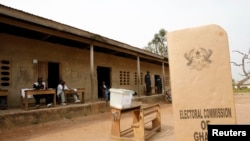Ghana's electoral commission will reopen the nation's voter registration list Friday so that tens of thousands of people whose names were deleted because of a problem with their identification documents can re-register in time to take part in December's general election.
The country's Supreme Court had ordered the electoral commission to delete from the registry anyone who applied to vote using a National Health Insurance Scheme card. The court said the health card was not a valid proof of identity for voting purposes.
So the electoral commission, which compiles the voter list, said anyone previously struck from the registry would have a week to re-register, beginning Friday. A separate period later this month has been set aside for registering those who have never voted before.
A commission spokesman, Eric Dzakpasu, told VOA that about 32,300 potential voters needed to re-register. He said the commission had met with the Interparty Advisory Committee to discuss registering the disqualified voters.
Anyone who has not registered to vote since 2014 will be able to register on August 19 or August 26, Dzakpasu said. After that, "we will compile a provisional register," to be made public in September, listing both new registrants and those who had used NHIS cards to prove their identity.
Transmission of results
Meanwhile, the acting chairman of the main opposition New Patriotic Party said his members were not happy with the plan for transmitting the results of December's presidential, parliamentary and local elections.
The NPP's Freddie Blay said the electoral commission had yet to explain fully how the proposed electronic system would operate.
Local media quoted Blay as saying: “The election stakeholders must know the process, from polling stations to the regions. If the votes are going to be electronically transmitted, we have to know. Other than that, we can’t be guaranteed that the elections will be free and fair.
Blay, addressing his remarks to the electoral commission, said stakeholders wanted to know when the transmission of results would occur, "so that we can follow it. If there is any mishap or mistake, either deliberate or otherwise, we will be in a position to draw the attention of the EC.”
Dzakpasu, the spokesman for the electoral commission, said all political parties were informed about the decision to use an electronic system to transmit election results. He also said that Blay's NPP was a signatory to the proposals, endorsed by all political parties, for the use of the electronic system.
This, Dzakpasu added, is part of the effort to ensure transparency in the electoral process.
“The substance of this reform is that after the elections, all polling station results would be brought to the collation center," he said. "When these results are entered into the collation sheets, it would be signed by all party agents together with the electoral commission. These collation sheets would be scanned and would be electronically transmitted to the national collation center at the capital, Accra, for the counting and declaration of the presidential results.
“Alongside this, we will have the computers and the projectors, where the results which are transmitted electronically would be projected on large screens for the general public, for the media, political parties, candidates and for observers to observe," Dzakpasu added. "This was a proposal which has been affirmed by the political parties at the Interparty Advisory Committee.”










